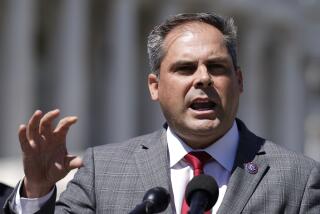Bush Initiative May Alter Budget Debate : Defense: The President appears to have gained an edge with his arms plan. But Democrats say he has opened the door for even deeper cuts down the road.
WASHINGTON — President Bush’s announcement of a unilateral reduction in nuclear arms could dramatically alter the congressional debate over Pentagon spending, while giving Bush at least a temporary advantage in the political infighting, according to defense policy experts.
But in the long run, it may cost him as Democrats see openings to make even deeper defense cuts than the Administration wants, the experts said.
In votes last week on the 1992 defense spending bill, the Senate killed two of the President’s programs--the MX rail-garrison and the short-range nuclear attack missile. Two of the programs for which Bush had hoped to salvage congressional support--the B-2 Stealth bomber and the Strategic Defense Initiative--were barely clinging to life after the Senate narrowly defeated votes to kill the bomber and cut funding for SDI, also known as “Star Wars.”
Many Republicans joined Democrats in the votes, charging that Bush’s defense budget took no account of the sudden demise of the superpower nuclear rivalry.
That charge lost some of its effectiveness with Bush’s Friday night speech. Bush ordered two programs killed that the Administration had fought unsuccessfully to save earlier in the week, the MX rail-garrison program and the short-range attack missile. Those changes, along with other proposals, would save $550 million in fiscal year 1992 and $20 billion over about 20 years, a small fraction of the Pentagon’s proposed budgets. But by proposing such concessions, many congressional observers say, the President seems to have dealt himself back into the defense debate at the last moment.
“Once again, when he looked like he was not reacting to the changes in the world, President Bush has launched a preemptive strike by going farther than many would have thought he would ever go,” said the Brookings Institution’s Lawrence J. Korb. “He’s regained the initiative” in the struggle with Congress over setting defense budget priorities, he added.
“In the wake of Friday’s speech, many lawmakers who voted against those programs last week can point to this and say, ‘look at what the President has done,’ ” Korb said. “It restores the middle ground that temporarily abandoned the B-2 and SDI last week because the President didn’t seem to have revised his policies in light of the recent Soviet changes.”
But the President’s actions could also have a downside.
Although initially caught off guard by Bush’s announcement, key Democrats rushed to take credit for the President’s proposals, noting that many Democrats had argued for similar cuts after the failed coup in Moscow. And the Democratic-controlled Congress quickly called for even further cuts in the defense budget.
Rep. Patricia Schroeder (D-Colo.), while complimenting the President on his proposals, called for speedier troop reductions in Europe.
“I think really what he (Bush) has done is . . . empowered those of us who have said things have gotten so much better that we should be able to look at that budget agreement and see what we can possibly do to save some money,” said the lawmaker on CNN’s “Newsmaker Sunday.” “I think it’s very important because the window’s open now, and, if we didn’t start moving now, we could lose this great opportunity.”
Schroeder, who serves on the House Armed Services Committee, added: “Congress desperately needs some money to address our economy at home.”
And the Administration’s controversial B-2 program suffered a serious setback when Sen. Sam Nunn (D-Ga.), who was a strong supporter of the plane, said that the nation’s defense may now require only half of the 75 planes that the President wants. Nunn, appearing on CBS-TV’s “Face the Nation,” said that because Bush has reduced the nuclear bomber force and the future military role of the B-2 is uncertain, the number of B-2s could be cut.
By signaling to Congress that he is prepared to give up on once-high defense priorities, Bush may merely have whetted the appetites of defense budget-cutters who are still looking for the “peace dividend,” policy analysts said.
“The risk is you’ve opened the door to go further,” said Gordon Adams, director of the Washington-based Defense Budget Project. “And that strategy can work, but it’s always a risky bet. If you open the door, people will walk through it and pretty soon you have an orgy of budget-cutting (and) program-cutting.”
Rep. Les Aspin (D-Wis.), reflecting the President’s increased impact in the defense debate, called the thrust of Bush’s proposals “right” and “far-reaching.” They also served the political purpose, Aspin said, of showing the American people “that the Administration recognized it was a different world.”
But Aspin, chairman of the House Armed Services Committee, also saw openings for deeper defense cuts. He warned that Bush’s proposals would yield only tiny budget savings in the near term. “To get real budget impact requires changes in conventional forces, and (Bush’s) initiatives do not address them,” said Aspin, who added that Congress would have to examine further cuts in troops and weapons.
Public opinion polls are showing a steady increase in the number of Americans who believe that defense spending should be cut. In a Wall Street Journal/NBC poll released Friday, more than four in 10 Americans said they believe that defense spending can be halved by the end of the decade, a goal that goes far beyond the Pentagon’s stated plan.
On Saturday, Defense Secretary Dick Cheney urged Congress to “work with” the Bush Administration in making further cuts. But he stopped short of threatening a presidential veto if Congress goes beyond the defense initiatives proposed by Bush.
More to Read
Get the L.A. Times Politics newsletter
Deeply reported insights into legislation, politics and policy from Sacramento, Washington and beyond. In your inbox three times per week.
You may occasionally receive promotional content from the Los Angeles Times.











